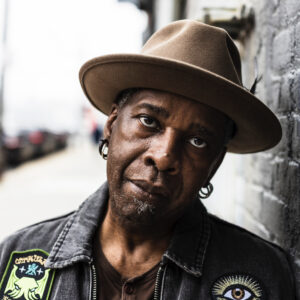
If you’ve followed the beats of his half-century career, you’ll know Vernon Reid as an artist who paints in every colour. Depending on the era you dive into and the album on your turntable, you’ll find the New York polymath pinballing between jazz, metal, punk, funk, electronica and hip-hop, cutting heads with collaborators as eclectic as Mick Jagger and Public Enemy, endlessly shedding his skin yet always speaking his truth.
Globally celebrated as a giant of electric guitar (he was recently hailed by Rolling Stone amongst the top 50 players of all-time), Reid’s Grammy Award-winning records with alt-rock trailblazers, Living Colour, still sound as fresh and fierce as when Cult Of Personality hijacked the Billboard chart in the late-’80s. But to take the pulse of the zeitgeist as he sees it – and hear his fearless musicality in microcosm – you need only drop the needle on his acclaimed new solo album, Hoodoo Telemetry, released October 3, 2025 on Artone / The Players Club Records.
It’s true: Reid never took the path of least resistance. Born in London on 22 August 1958, to music-loving parents of the Windrush generation, within a year the family had upped and moved to New York City. He remembers the seismic shift of hearing The Beatles on The Ed Sullivan Show in 1964 and the moment a guitar called to him. “I heard Carlos Santana’s Black Magic Woman and it entranced me.”
Just as influential were the local musicians on his block (new track Meditation On The Last Time I Saw Arthur Rhames salutes the “otherworldly” multi-instrumentalist from Eternity, who coached his young neighbour but died of AIDS in 1989).
By his early twenties, and already playing with rare maturity, Reid left an early thumbprint on The Decoding Society, the avant-jazz outfit helmed by charismatic, genre-crossing Texan drummer Ronald Shannon Jackson. Even then, it was obvious Reid would need other outlets to capture all the ideas ricocheting around his brain. In 1985, he released Smash & Scatteration alongside jazz talisman Bill Frisell and co-founded the Black Rock Coalition with Village Voice writer and lifelong friend Greg Tate, demanding an end to racial glass ceilings in the music business. “There was still a bunch of dudes smoking cigars,” he reflects, “in a room that you’re not allowed to go into.”
Living Colour was formulating around the same time, and Reid’s best-known band burst into bloom on a New York live circuit that was more fluid than ever before or since. “We had an ecology of clubs to play at, from CBGBs to the Cat Club and the Ritz,” he recalls of the first steps of a solidified lineup featuring Corey Glover (vocals), Muzz Skillings (bass) and Will Calhoun (drums).
Seizing his opportunity, Reid threw everything on his mental jukebox at Living Colour’s deathless debut, 1988’s Vivid. Sailing to #6 on the US Billboard chart – and ultimately double-platinum status – Vivid proved adventurous music could still sell by the ton. Alongside Living Colour’s six albums and counting, Reid has worn a thousand different hats since those breakout years, whether producing Grammy-nominated albums for the likes of Salif Keita, composing hit movie scores or lending his guitar skills to a who’s who including Janet Jackson, B.B. King, Tracy Chapman and Mariah Carey.